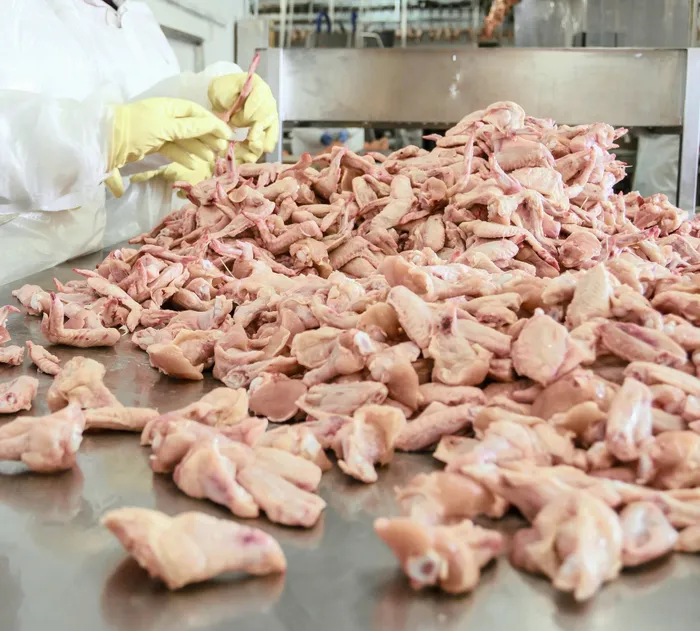US trade terms, Agoa uncertainty threaten South Africa’s poultry industry — experts warn
TRADE

These concerns were raised during a webinar hosted by the FairPlay Movement on Tuesday, where stakeholders discussed the implications of US trade policies, avian influenza regulations, and the future of South Africa’s poultry industry.
Image: File

These concerns were raised during a webinar hosted by the FairPlay Movement on Tuesday, where stakeholders discussed the implications of US trade policies, avian influenza regulations, and the future of South Africa’s poultry industry.
Image: File
Industry leaders have warned that South Africa’s poultry sector faces mounting pressure from unfair US trade advantages, uncertainty around the African Growth and Opportunity Act (Agoa), and anti-dumping exemptions that undermine local producers.
These concerns were raised during a webinar hosted by the FairPlay Movement on Tuesday, where stakeholders discussed the implications of US trade policies, avian influenza regulations, and the future of South Africa’s poultry industry.
Izaak Breitenbach, CEO of the South African Poultry Association (SAPA), said it was concerning that the US continues to export chicken to South Africa without paying anti-dumping duties, despite the country losing its Agoa benefits.
Breitenbach said that there is a lot of concern on an agreement that led to self-regulation for highly pathogenic Avian Influenza.
“What that means is that America can determine when they export chicken to South Africa, when they have high Avian Influenza or not,” he said.
“Now, we are the only country in the world that allowed that. What happened in negotiations recently was that the South African delegation came under pressure from the US delegation. They agreed to this self-regulation with the Americans and implemented it.”
“That is actually and effectively allowing for dumping of chicken in South Africa. That agreement was reached during the Agoa negotiations of 2015,” Breitenbach said.
“Subsequent to that, we have lost all our trade benefits to the US. And yet, the US is still exporting chicken to South Africa, not paying the anti-dumping duty. That should have fallen away.”
Breitenbach added that they believe the US now wanted Most Favored Nation (MFN) tariff removed on US exports to South Africa.
“The MFN duty is not only an American duty. It is a widespread national duty. We cannot afford to allow Americans not to pay the duty and then be under pressure from all the other countries to not pay the duty,” he said.
Matshidiso Lecoasa, chairperson of the Budget Justice Coalition, said trade discussions often overlook how policies like Agoa and anti-dumping duties directly affect food security and smallholder farmers.
“When it comes to trade policy and trade deals, there is a clear link between unfair trade deals and food insecurity in our country that's not really spoken about as much,” Lecoasa said.
“True food security will mean building fair trade terms that also protect local producers, stabilize prices and ensure that every household can afford nutritious food, can have access to good quality poultry in this case.”
Thabile Nkunjana, a senior economist at the National Agricultural Marketing Council, said government must work more closely with industry players when negotiating trade terms.
“There needs to be serious discussions, because as much as we do comment on these issues as, and sometimes do, visiting farmers the reality is that the industry is the one that knows the number of issues that it's facing. And sometimes, the government may not necessarily have every understanding of it,” Nkunjana said.
Breitenbach echoed this frustration, saying the poultry industry has been excluded from recent US negotiations.
“There's a huge amount of concern by the fact that we have not been consulted at all. We have not been involved in any forum so far to assist the government to understand what our industry is prepared to give in terms of the US negotiations,” he said.
Breitenbach pointed to the Poultry Master Plan, implemented in 2019, as a success story that revived the sector after nearly a decade of distress.
He said that the negotiation team is putting on the table in the U.S. to bring more chicken, dump more chicken.
“The very core achievement that we've had in the past, we are now giving away in terms of what we are prepared to compromise in terms of poultry,” he said.
Breitenbach also called for the government to support the industry’s plan to vaccinate poultry against highly pathogenic avian influenza, which he said costs producers about R9.5 billion during outbreaks.
“We are carrying that currently and we want to stop the costs to the industry through vaccination."
BUSINESS REPORT